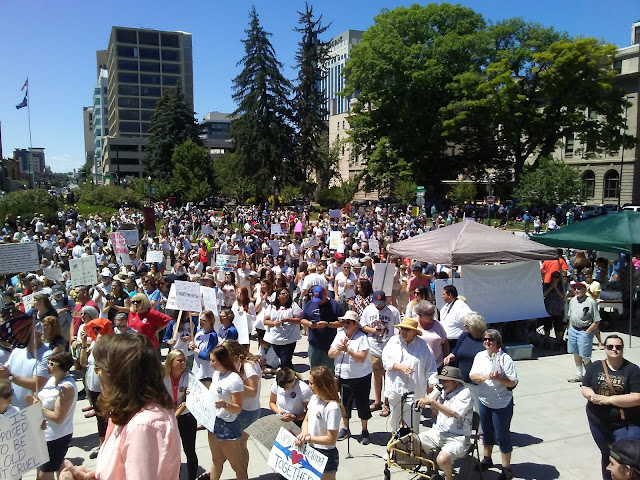Immigration as an issue has come to mean a lot to me over the past couple of years--largely because of the whirlwind of discovery that is DNA testing. The stories of immigrants, more than ever before, are my stories. I have so many immigrant ancestors I had no idea existed. And truthfully, many times it was because I wasn't allowed to know they existed. But I wouldn't be here today if it weren't for the freedom of people to build new lives in new places. I couldn't be more proud of my immigrant heritage, and the richness of the narratives that have come into my life now that I have the privilege to know them.
Arriving at the capital building in downtown Boise, I wasn't prepared for the massive turnout of people I saw--with hundreds more showing up by the minute. My heart felt so full to see I wasn't alone, and it brought a moment of clarity that nearly overwhelmed all my senses.
 |
| From the "FamiliesBelongTogether march in Boise, Idaho June 30th, 2018 |
Minidoka was a Japanese internment camp in Idaho. #KeepFamiliesTogether rally in #Boise. #NeverAgain pic.twitter.com/jDN8NpPpzE— Nancy DeWitt (@IdahoLark) June 30, 2018
As I clutched the sign I'd been thinking about for days, the face of my grandmother filled my mind. She came to the United States as a bi-racial woman in 1963, during the height of the Civil Rights movement. She had very little money, a small daughter, and was fleeing the threat of violence from her former husband after her tumultuous divorce and custody battle. She'd told me that story herself the last time I ever saw her alive. It was the first and only time I'd ever heard the story.
The realization dawned on me that if her same situation was playing out today, she wouldn't have the money or the "importance" to be admitted into the United States "legally." She'd have to come seeking asylum, and would have been separated from her daughter at the border--maybe to never see her again.
For the first time, I considered how life would be different if it were MY family in the circumstances of those arriving at the southern border. My emotion nearly overcame me. My grandmother would have been destroyed. In everything I know about her and how sensitive she was, she could never have coped with that kind of violence. My aunt would have been forever traumatized. The very thought of it breaks my heart, in a way I'm struggling even now to put into words.
It didn't take until that moment for me to act, to reject this cruelty with the full weight of my convictions. But it wasn't until I was in that setting, standing up for someone else, that I could touch some of that pain with my own hands and imagine if it belonged to my family. It made me see my own grandmother with new eyes. It was only then that I understood, in the fullest sense, who I am and where I come from.
I've been in search of those answers as a genealogist for all of my adult life. And I found some of them today; not in records or repositories, but in the lived experiences of others who are walking the same path my grandmother walked on. Marching beside them is its own kind of family history research. Holding a handmade statement of my convictions, surrounded by other people who had come to do the same, is its own kind of new discovery.


